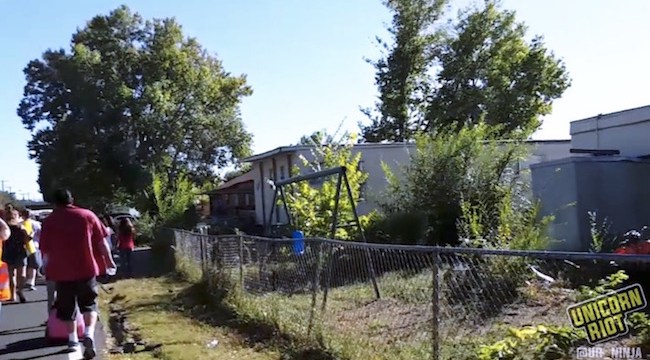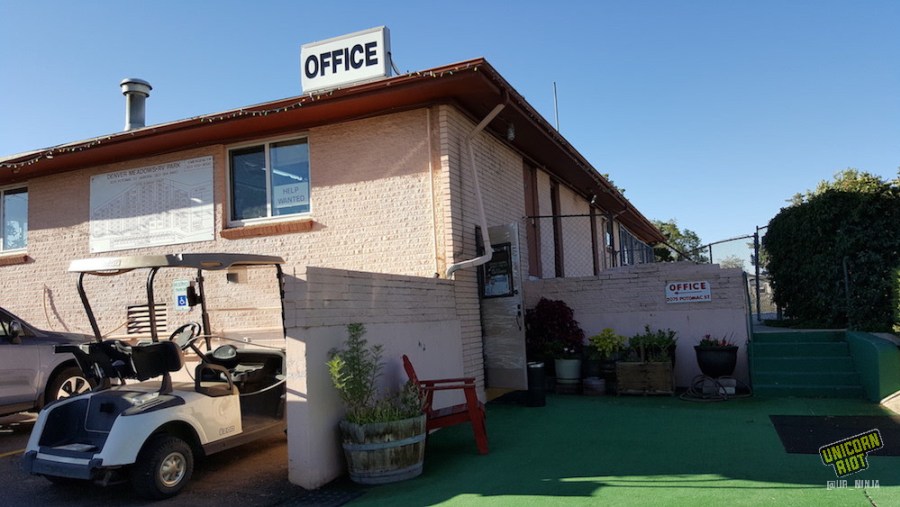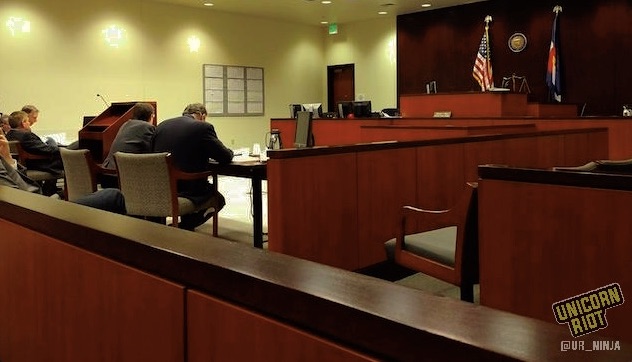First Lawsuit Hearing for Mobile Home Park Residents Suing Park Owners
Aurora, CO – On February 23, 2018, residents of Denver Meadows Mobile Home Park, members of 9to5 Colorado, and community members attended the first hearing in a collective lawsuit filed against the park’s owners.
The lawsuit alleges that since the time the park’s residents created a homeowners’ association called Denver Meadows Vecinos Unidos Homeowners’ Association in spring 2016, the park’s owners have been continuously retaliating. The residents have been meeting to organize ways to address management issues and to convince the owners not to rezone and sell their home.
Denver Meadows residents say they have received two rent hikes within a year, been subject to verbal harassment and threats of eviction, the imposition of improper fees, and more.
Another section of the lawsuit alleges that Denver Meadows demolished mobile homes without proper permits or proof of asbestos testing. According to the Office of Safety and Health Administration’s (OSHA) fact sheet on asbestos, certain materials are presumed to contain asbestos if installed prior to 1981, including roofing and siding shingles, vinyl floor tiles, thermal system insulation, plaster, cement, putties and caulk, and many more. The mobile homes which were demolished were built before 1981.
Unicorn Riot filmed the press conference, which was held outside the courthouse before the hearing:
Andrea Chiriboga-Flor, Transit and Housing Organizer with 9to5 Colorado, spoke at the press conference:
‘Mobile Homes’ is a misnomer. They’re not actually mobile, and so this would be devastating for families.”
In late April 2016, residents of Denver Meadows noticed a yellow sign posted on a fence in the park grounds that read “rezoning hearing May 11, 2016.” Without any direct communication from the park’s owners, the residents realized their home was in jeopardy.
At the rezoning hearing on May 11, 2016 in front of the Aurora Planning Commission, testimony lasted for over five hours with nearly 200 community members attending and nearly 100 residents speaking. The planning commission voted in the residents’ favor to not recommend the zone change to city council. On July 11, 2016, in another win for residents, the Aurora City Council voted to table the request for rezoning.
Faye Cline and Shawn Lustigman, the co-owners of the mobile home park, have not slowed down their efforts to rezone and sell the property. Lustigman owns two other parks in Colorado and more across the country.
In the fall of 2017, 9to5 Colorado contacted Resident Owned Communities (ROC) to help the nearly 100 Denver Meadow residents purchase the property from Cline and Lustigman. ROC made a $20.5 million offer to finance the 20.4 acre park and turn it into a resident-owned cooperative. Cline and Lustigman rejected the offer and countered that they were looking to sell half the park for $27.5 million.
On February 23, the Adams County courtroom was packed full with more than 50 people in support of the mobile home park.
Throughout the four hour hearing, five Denver Meadows’ resident homeowners were on the stand answering questions from their lawyer, Michael Hutchinson, and from the park owners’ lawyer, Glenn Merrick.
Petra Bennett was first on the stand and out of the five residents, she has lived in the park the longest – for 17 years. Attorney Michael Hutchinson asked her questions about the asbestos concerns. Bennett explained that the park’s handyman who is about 70 years old tore down the mobile homes by himself and was not wearing any protective gear.

Bennett also spoke about the $60/month rent increase she received soon after the first homeowner’s association meeting saying:
We had never had rent increase that much.”
When talking about the harassment from management, Bennett told the court that Cline
uses binoculars to look at things in the park, and she slows down by the house where we have meetings in. Management peeked into windows of my house for about two years.”
During cross examination, Attorney Glenn Merrick asked Bennett about Cline’s eye health:
Do you have personal knowledge of Faye’s eye health? Maybe she is using binoculars to help see better.”
Bennett replied boldly,
She seems to see fine when I go to her office to pay my rent.”
She went on to tell the court about one day when she noticed her vines, bushes, and trees cut back in her yard. She approached Cline about it and Cline’s response was that she needs to be able to see inside Bennett’s yard and house.
Merrick wondered out loud,
Your bushes and vines could have been getting in the way of utilities, getting in the water and gas lines? Could that have been why they needed to be cut back?”
Bennett quickly responded by saying,
No. Cutting back the plants on top of the ground wouldn’t effect anything underground.”

Merrick asked each resident if they had the materials from the demolished homes tested, and each resident said they did not. (In order to get a sample tested, a professionally trained inspector who has the proper protective gear can collect a sample and bring it to a lab to get tested. The whole process costs about $300.)
When Nancy Ibarra was on the stand, she told the court how during the demolition of a home next door to hers, her and her husband got sick. She had bad allergies and a sinus infection, and her husband got bronchitis.
None of the residents were given notice that these demolitions were going to happen, and according to the residents’ testimonies, there was no effort by Denver Meadows management to contain the demolished materials. Residents spoke of finding insulation and other pieces of the mobile homes in their yards.
The next hearing is on March 6, 2018 at 1:30pm at the Adams County Courthouse. The park’s owners will bring two witnesses to testify on their behalf. It will also be decided if this court has the legal authority to issue an injunction on the park with respect to the asbestos, or if the Colorado Department of Public Health and Environment has jurisdiction.
Unicorn Riot will continue covering this lawsuit and will provide updates as they become available.
To help our volunteer-operated, horizontally-organized, non-profit media collective please consider a tax-deductible donation:
Unicorn Riot coverage on Denver’s housing crisis and unhoused community:
- Crisis of the Unhoused – Landing Page for Unicorn Riot Coverage
- Dozens of Migrant Families Face Eviction in Aurora, CO with Less Than One Week’s Notice (Aug. 8, 2024)
- Denver Unhoused Advocacy Group Releases Winter Shelter Survey Data (May 8, 2024)
- Denver Migrant Encampment Faces Further Displacement, Auraria Campus Palestine Solidarity Camp Grows [Press Conference] (May 3, 2024)
- ‘Ya’ll Just Voted to Kill People!’: Denver City Council Upholds Mayor’s ‘No Freezing Sweeps’ Veto (February 23, 2024)
- Denver Passes ‘No Freezing Sweeps’ Bill, Potential Mayor Veto Looms (February 2, 2024)
- With Nearly 60 Frostbite Injuries in Unhoused Community, Advocates Encourage Denver to Do Better (December 21, 2022)
- Sit-in at Denver Recreation Center Leads to Meeting with City (March 23, 2022)
- Unhoused Community & Advocates Take Over Denver Recreation Center (March 10, 2022)
- Federal Judge Rules Denver Cannot Conduct Sweeps Without At Least 48-Hour Written Notice (Jan. 30, 2021)
- Denver Sweeps 300+ Tent Encampment Residents (Nov. 30, 2020)
- Seven Arrested at Action Against Houseless Sweeps (Nov. 20, 2020)
- Unhoused Residents Find Refuge at Downtown Vigil (Oct. 17, 2020)
- Denver Housing Advocates Launch 5256-Minute Vigil at City Hall (Oct. 14, 2020)
- Denver ‘Clean-ups’ Displace 100+ Unhoused Residents Amid Health Crisis (April 30, 2020)
- Housing First Advocates Protest USICH Director Marbut’s Visit to Denver (Feb. 21, 2020)
- Denver Police Cash In on Houseless Encampment Clean-Ups (Feb. 5, 2020)
- Judge Rules Denver’s Camping Ban Unconstitutional, Dismisses Jerry Burton’s Ban Ticket (Jan. 3, 2020)
- Advocates Demand Denver Protect Rights of People Without Homes (Oct. 21, 2019)
- Denver’s ‘Right to Survive’ Ballot Initiative Voted Down (May 9, 2019)
- “Unhealthy By Design:” CU Denver’s New Report About Camping Ban (April 13, 2019)
- Denver Paid Clean-Up Company $400,000 to Help in Houseless Sweeps (Nov. 27, 2018)
- Denver Police, City Workers Throw Away Belongings Amid Lawsuit (July 16, 2018)
- Class-Action Against Denver for Criminalizing Houselessness Moves Forward (May 11, 2018)
- Fourth Push for Homeless Bill of Rights in Colorado Legislature (March 14, 2018)
- First Lawsuit Hearing for Mobile Home Park Residents Suing Park Owners (March 2, 2018)
- Denver’s First Tiny Home Village ‘Beloved Community Village’ Turns Six Months Old (January 19, 2018)
- Denver Park Rangers Take Sleeping Bag, Tent from Houseless Man in 25 Degree Weather (November 12, 2017)
- Eighty Families Offer to Purchase Mobile Home Park to Avoid Eviction (September 25, 2017)
- Denver Human Rights Activist and Community Organizer, Terese Howard, Faces Up to 30 Days in Jail (August 24, 2017)
- Class-Action Lawsuit Against Denver: Motions Filed for Summary Judgement (August 15, 2017)
- U.S. District Court of CO Certifies One of the Largest Houseless Class-Actions in U.S. History (April 29, 2017)
- Three Convicted in Camping Ban Trial Two Weeks Ahead of Right to Rest Act Hearing (April 18, 2017)
- Three Co-Defendants Fight Denver’s Camping Ban in Court (April 4, 2017)
- Third Push for Homeless Bill of Rights in Colorado Legislature (Feb. 24, 2017)
- With Mayor’s Approval, Denver Continues Survival Gear Confiscations (Dec. 16, 2016)
- Denver to Continue Confiscating Survival Gear of Unhoused Under Encumbrance Ordinance, to Stop Under Camping Ban (Dec. 11, 2016)
- Denver Intensifies Sweeps of Unhoused Community and Confiscates Survival Gear; Parade of Rights Rally (Dec. 4, 2016)
- First Hearing in Class-Action Against Denver for Violating Human Rights (Oct. 14, 2016)
- Class-Action Lawsuit Against Denver: Motion Filed for Recusal of Judge Shaffer (Sept. 22, 2016)
- People Without Housing File Lawsuit Against the City of Denver (Aug. 27, 2016)
- Denver’s Affordable Housing Displaces Low-Income Residents (June 20, 2016)
- City of Denver Cracks Down on its Homeless Community (Dec. 20, 2015)
- Homeless Forced Out of Tents and into Snowstorm by Denver Police (Dec. 16, 2015)
- Resurrection Village: Denver Police Destroy Tiny Homes and Arrest Builders (Oct. 27, 2015)



